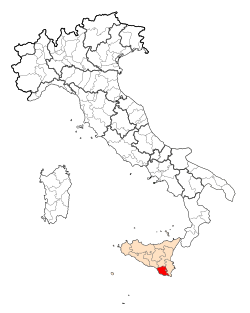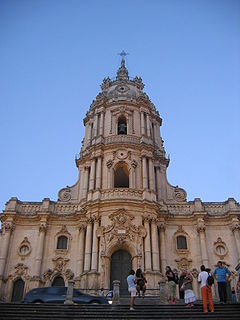Province of Ragusa
This article relies largely or entirely on a single source. (February 2024) |
Province of Ragusa | |
|---|---|
 Palazzo della Provincia, the provincial seat | |
 Map highlighting the location of the province of Ragusa in Italy | |
| Coordinates: 36°55′30″N 14°43′50″E / 36.92500°N 14.73056°E | |
| Country | |
| Region | Sicily |
| Capital(s) | Ragusa |
| Comuni | 12 |
| Government | |
| • President | Dario Cartabellotta |
| Area | |
| • Total | 1,623.89 km2 (626.99 sq mi) |
| Population (28 February 2017) | |
| • Total | 321,192 |
| • Density | 200/km2 (510/sq mi) |
| GDP | |
| • Total | €5.570 billion (2015) |
| • Per capita | €17,428 (2015) |
| Time zone | UTC+1 (CET) |
| • Summer (DST) | UTC+2 (CEST) |
| Postal code | 97100, 97010-97015, 97017-97019 |
| Telephone prefix | 0932 |
| Vehicle registration | RG |
| ISTAT | 088 |

The province of Ragusa (Italian: provincia di Ragusa; Sicilian: pruvincia 'i Rausa) was a province in the autonomous region of Sicily, Italy, located in the southeast of the island. Following the abolition of the Sicilian provinces, it was replaced in 2015 by the free municipal consortium of Ragusa (Italian: libero consorzio comunale di Ragusa). Its capital is the city of Ragusa, Sicily, which is the most southerly provincial capital in Italy.
Geography
[edit]From Scoglitti to Pozzallo, the Ragusan coastline is approximately 85 kilometres (53 mi) long. Along the Ragusan coast are many fishing villages such as Kaukana, Punta Secca, Marina di Ragusa and Marina di Modica. The Hyblaean Mountains are dominating the north of the province and its highest peaks are Monte Lauro, Monte Casale and Monte Arcibessi. The rivers of the province are the Irminio, Dirillo and Ippari and the only lake in the province is the Lago di Santa Rosalia along the course of the Irminio river. The skyline of Ragusa is punctuated by the towers, domes and cupolas of the many churches for which the province is known. The area is mostly unspoilt, as during the 19th century and early 20th century there was large migration from Ragusa to the more prosperous areas of Italy and abroad.
It has an area of 1,623.89 square kilometres (626.99 sq mi) and a total population of 321,192 (2017). There are 12 comunes (Italian: comuni) in the province [1] (see comunes of the province of Ragusa). By population, they are:
| Commune | Population |
|---|---|
| Ragusa | 73,534 |
| Vittoria | 63,886 |
| Modica | 54,472 |
| Comiso | 30,201 |
| Scicli | 27,179 |
| Pozzallo | 19,487 |
| Ispica | 16,233 |
| Acate | 11,047 |
| Santa Croce Camerina | 10,767 |
| Chiaramonte Gulfi | 8,218 |
| Giarratana | 3,092 |
| Monterosso Almo | 3,075 |
Economy
[edit]Parts of the province have changed dramatically in the late 20th and early 21st centuries, largely due to tourism. However, others are relatively unchanged from pre-industrial times. Main productive activities can be found in the towns of Ragusa and Pozzallo, where the two major industrial areas are located. The west and south of the province are mainly dedicated to the intensive farming in greenhouses and the local vegetables leave from the Market of Vittoria to be exported to all of Europe making the province of Ragusa one of the biggest producers of greenhouse produce. In the areas around Ragusa and Modica cattle farming is at the highest levels in the region for milk, dairy and meat production. Tourism has now replaced the fishing industry as the principal source of employment along the coast.
Transports
[edit]- There are no motorways in the province and the main roads are the National SS.115 that crosses from west (Gela) to east (Syracuse) and the SS.514 that running north connects Ragusa to Catania. The SP.25 (Provincial Road) runs south from Ragusa to Marina di Ragusa.
- The 120 kilometres (75 mi) of railway network of the province are entirely on single track and not electrified. Regional trains run regularly connecting the major cities.
- Comiso Airport during the cold-war was the biggest NATO base in Europe and has recently been refurbished to be converted from military to civil airport.
- The Port of Pozzallo is the only cargo and passengers port (service to Malta), and is located in the southern part of the province.
- The other ports are either fishing ports like Scoglitti and Donnalucata or Marinas for touristic boats like Marina di Ragusa and Punta Secca.



Main sights
[edit]Baroque
[edit]The cities of Ragusa, Modica and Scicli contain many examples of baroque architecture and from 2002 are part of the World Heritage. The main monuments are:
- Cathedral of San Giovanni (Ragusa)
- Portal of San Giorgio (Ragusa Ibla)
- Duomo of San Giorgio (Ragusa Ibla)
- San Giorgio Cathedral, Modica
- Duomo of San Pietro (Modica)
- Church of San Bartolomeo (Scicli)
- Palazzo Beneventano (Scicli)
Archeology
[edit]- The main archeological site of the province is the Greek city of Kamarina located on the coast.
- Others are Kasmenai, Akrillai, Scornavacche, Kaukana (Roman), the Roman Baths of Comiso and the Cava Ispica.
Castles
[edit]- Castle of Donnafugata, near Ragusa, is a beautiful example of country residence of the Baron Corrado Arezzo that dominates the surrounding countryside.
- Castle of the Counts of Modica in Modica town centre.
- Castle of Naselli d’Aragona in Comiso dating to 1576.
- Ruins of the fortress of Parco Forza in Ispica.
- Acate is housing the Castle of the Prince of Biscari constructed originally in 1494, it is a commanding feature of the town square. The construction of the castle was ordered by Baron Guglielmo Raimondo Paternò, its golden coloured stone work has been modified many times during its long history, it now appears more as an 18th-century palazzo than a castle, although some crenelations and towers remain.
See also
[edit]References
[edit]- ^ Regions and Cities > Regional Statistics > Regional Economy > Regional Gross Domestic Product (Small regions TL3), OECD.Stats. Accessed on 16 November 2018.

